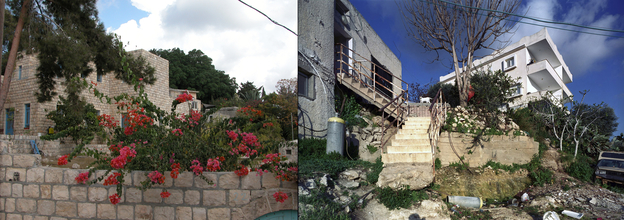On 6th February, 2005, One Land Two Systems is presenting the results of its international architecture competition for an alternative to the Israeli government masterplan devised for the ‘unrecognised’ Palestinian village of Ein Hud in Israel. The story of Ein Hud, south of Haifa, is a typical example of the complex reality of ideological planning in Israel – and how such planning contributes to the Israeli-Palestinian tragedy.
The competititon has been a huge success, with over 100 entries arriving from more then 30 countries, each one outlining a sustainable and liveable alternative for the Palestininan village, in contrast to the Israeli government’s unworkable plan. The great international response shows that people worldwide are deeply concerned about the abuse of their profession for political reasons. This is not just an Israeli problem, but has global significance, says Malkit Shoshan, an Israel architect and Director of FAST (The Foundation for Seamless Territory), which organised the competition.
Before the advent of the State of Israel, Ein Hud was an ancient Palestinian village on Mount Carmel. During the War of Independence of 1948, the Israeli army occupied the village, and the 900 villagers became refugees overnight. One group, the extended family of Muhammad Abu al Hayja, fled to nearby family land on the mountain and began building a new village, called Ein Hud after the old one.
Meanwhile, in the early 1950s, the picturesque old village was ‘discovered’ by Jewish artists, who eagerly moved in, calling it Ein Hod. So began the parallel development of Ein Hod/Ein Hud, the Jewish village becoming an exclusive artists’ village and tourist destination, while Palestinian Ein Hud, illegal and unofficial, spent the next 50 years without even basic services such as water and electricity. When finally recognised, in 2004, Ein Hud was subjected to a discriminatory ‘masterplan’ aimed at repressing its Palestinian identity.
Through the project, One Land Two Systems, a wide network of architects, planners and human rights organisation from all over the world have come together, in order to provide better planning solutions for a community that has been harassed by the formal planning bodies in Israel.
During the event in De Balie, the architecture competition jury will announce the winners of the competition. A public discussion follows, in which FAST will describe its work and its collaboration with different organisations. It will detail other cases where plans and masterplans violate human rights, and discuss the question of what can be done to reclaim planning tools in order to create better environments.
Participants:
Muhammad Abu al Hayja (Mayor, Ein Hud); Aaron Betsky (Director, NAI); Petra Blaisse (InsideOutside); Rebecca Gomperts (Women on Waves); Rassem Hamaissi (Geographer, Haifa University); Sandi Hilal (Stateless Nation); Sandy Kedar (Lawyer, Haifa University); Rachel Leah Jones (maker of the film, 500 Dunam on the Moon); Malkit Shoshan (Director, FAST); Eyal Weizman (architect, London); Oren Yiftachel (geographer, Be’er Sheva University), Hana Hamdan (Adalah Legal Centre for Arab Minority Rights in Israel); moderator Lucas Verweij.
Timetable
De Balie, 2pm: Screening of the documentary film, 500 Dunam on the Moon by Rachel Leah Jones
De Balie, 3pm: Announcement of the competition winners and a public discussion on planning in Israel
Mediamatic, 6pm: Opening of the exhibition of competition entrants (more details to follow soon)
For further information, contact:
FAST (editorial content, interview requests etc): info@seamless-israel.org
De Balie (phone reservations): +31 20 55 35 100
Mediamatic (exhibition): +31 20 638 9901
The exhibition can also be visited online from 6th February at www.seamless-israel.org or www.mediamatic.net
